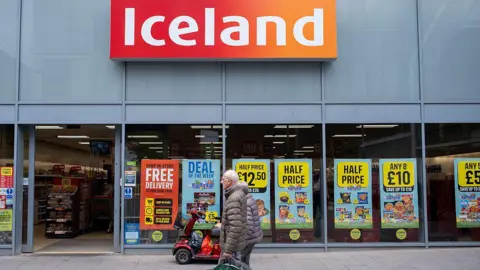In a bold move to combat rising levels of retail theft, supermarket chain Iceland has decided to implement a financial incentive for customers who report shoplifting incidents. This innovative approach aims to engage the public in crime prevention efforts while tackling the serious issue of retail loss, which has been estimated to cost the company around £20 million annually.
Richard Walker, the executive chairman of Iceland, announced that customers who notify staff about a theft in progress will receive a £1 credit on their Iceland Bonus Card as a reward for their vigilance. This initiative is not just about reducing losses; it seeks to change the perception of shoplifting, which many may mistakenly view as a minor infraction or even a victimless crime. Walker emphasizes that “it is not a victimless crime,” explaining how shoplifting affects the business negatively, hindering its ability to invest in lower prices and employee wages, ultimately impacting both staff and customers.
This financial reward for reporting theft comes during a notable increase in incidents of shoplifting across England and Wales. According to recent statistics from the Office for National Statistics, police reported a staggering 530,643 shoplifting offenses in the year leading up to March 2025. This marks a significant 20% increase from the previous year’s figure of 444,022 and represents the highest level of retail theft recorded since current tracking began in the 2002-03 period. Such alarming escalation has prompted widespread concern amongst both retailers and law enforcement.
In response to these growing issues, the government has pledged to reinforce neighborhood policing with plans to deploy thousands of additional officers on patrols by spring 2026. Walker’s comments reflect a pressing need for collaborative crime prevention efforts between businesses and the community, suggesting that customers’ participation could potentially enable lower prices throughout stores. He remarked, “We’d like customers to help us lower our prices even more by pointing out shoplifters,” underlining the mutual benefits of engaging the public in this battle.
The initiative has sparked conversation about the role of individuals in supporting local businesses through active participation in crime prevention. By offering a tangible reward, Iceland is not only incentivizing customers to report theft but is also seeking to cultivate a sense of responsibility within the community surrounding larger retail operations. Iceland’s innovative scheme could potentially foster a culture of vigilance among shoppers, which, if successful, might lead to decreased theft and improved market conditions.
As the campaign unfolds, it remains to be seen how effectively this strategy will influence shopping environments and deter would-be shoplifters. Nonetheless, Walker’s call to action underscores a fundamental principle: collective vigilance may be essential in combatting retail crime that imposes costs on both businesses and responsible consumers. Moreover, the recognition of shoplifting as a serious issue reinforces the need for effective measures that safeguard not just company profits, but the integrity and safety of shopping spaces for all customers.
Overall, Iceland’s £1 reward initiative serves as a microcosm of the broader challenges facing the retail sector in the current climate, catalyzing discussions about theft prevention and community engagement while aiming to mitigate significant financial losses incurred from a rising fluency in retail crime. With continuing public support and cooperation from the government, businesses may find that their losses can be curtailed more effectively, creating a more sustainable retail landscape.












